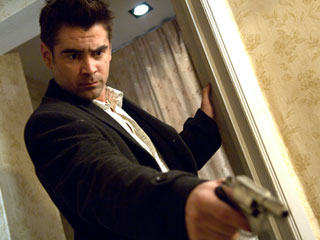In Bruges: Killer Holiday
by M. Faust

I didn’t see a shout-out in the end credits of In Bruges to the tourist board or chamber of commerce of the city of Bruges, but surely it was my new glasses failing to focus. Because if ever a movie was likely to bring a flood of tourists to a location, this is it. I’d love to spend my next vacation there.
Of course, I’m assuming that all of the extreme violence, florid profanity and drug-addicted dwarves seen in the film are not part of the standard tourist package. I’ll have to ask my travel agent about that.
A port city in the Flemish region of Belgium chartered in 1128, Bruges is celebrated for its large variety of well maintained medieval architecture. The first sight of it in the film is enough to take your breath away.
Not so that of Ray (Colin Farrell), whose immediate reaction on arrival is “Shithole.” His traveling companion, Ken (Brendan Gleeson), is more disposed to enjoying what the place has to offer, but it’s clear that these two don’t belong here.
In short order we learn that they are professional hit men, Irish by birth but working in London, and have been sent to Bruges to lie low after their last assignment went awry. We are, of course, reminded of Vincent and Jules, the killers whose relentless gabbiness in Pulp Fiction influenced a generation of independent filmmakers.
But while this first feature film by Martin McDonagh is certainly in the same ballpark as Quentin Tarantino, it’s equally reminiscent in tone and spirit to another playwright-turned-filmmaker, David Mamet. A young sensation who had four plays running simultaneously in London’s West End (the last one to do that was Shakespeare), McDonagh’s work for the stage is apparently more shocking than most of what is on display here. Prior to a final reel filled with bloodletting, the majority of In Bruges is concerned with guilt and expiation, generally discussed with an exacting level of profanity that is percussively musical in its attempts to fill in the blank spaces of what its speakers can’t quite convey.
(McDonagh is also enamoured of the sounds made by people trying to communicate in languages they don’t entirely comprehend, as well as by the dislikes people from some countries have for people from other countries. However much any of this may or may not drive the plot forward, it’s generally pretty entertaining to watch.)
The first half of the film is almost lackadaisical, as Ken drags Ray around the city’s museums and tries to take his mind off the job that went bad. Farrell, making ample use of the best onscreen eyebrows since Groucho Marx, sulks and stomps his feet like a petulant child, an amusing performance which turns out to have a layer of irony when we learn just how he screwed up back in London. The character is not dissimilar to the one he played in Woody Allen’s recent Cassandra’s Dream, and demonstrates that the actor may yet make a lasting mark in movies if he can stay away from the kind of matinee heroes he was cast as in Alexander and the atrocious Miami Vice.
Ray eventually finds distraction (and an amount of low-key trouble) with members of a film being shot locally, a touch that threatens to overwhelm In Bruges with Fellini-ism. But the plot eventually kicks in with the appearance of the film’s third major character, Ken and Ray’s gangster boss Harry (played by Ralph Fiennes, making maximum use of that mouthful of uncapped, point teeth).
Harry’s arrival jolts us into realizing that a movie about murderers has to take them to task for their deeds. What makes the film worth our while, aside from the delight of its dialogue and scenery, is that these characters take themselves to task as well. It’s asking a lot of viewers to sympathize with murderers, and In Bruges sometimes founders in its attempts to balance the human nature of their characters with their essential alienness. But McDonagh generally manages to make the best of such difficulties, balancing his serious moral enquiries with self-referential jokes about the fact that what we’re watching is, after all, only a movie.
|
Issue Navigation> Issue Index > v7n8: The Silent Treatment (2/21/08) > In Bruges: Killer Holiday This Week's Issue • Artvoice Daily • Artvoice TV • Events Calendar • Classifieds |









 Current Issue
Current Issue